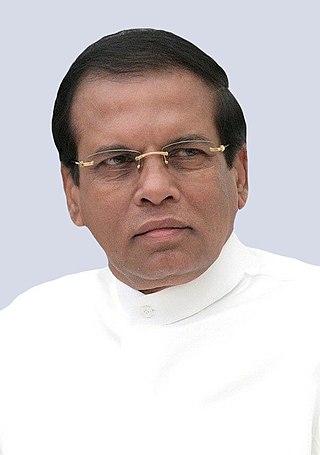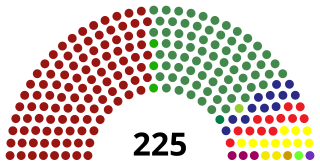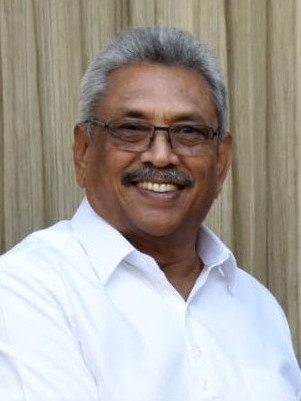
Ranil Wickremesinghe is a Sri Lankan politician who served as the ninth president of Sri Lanka from 2022 to 2024. Previously, he served as Prime Minister of Sri Lanka from 1993–1994, 2001–2004, 2015–2018, 2018-2019 and in 2022. He held several ministerial roles, including Minister of Finance, Minister of Defence, Minister of Technology and Minister of Women, Child Affairs and Social Empowerment. Wickremesinghe has led the United National Party (UNP) since 1994 and has been Prime Minister of Sri Lanka on six occasions.

The United National Party is a centre-right political party in Sri Lanka. The UNP has served as the country's ruling party, or as part of its governing coalition, for 38 of the country's 74 years of independence, including the periods 1947–1956, 1965–1970, 1977–1994, 2001–2004 and 2015–2019. The party also controlled the executive presidency from its formation in 1978 until 1994 and again from 2022 to 2024.

Mahinda Rajapaksa is a Sri Lankan politician. He served as the sixth President of Sri Lanka from 2005 to 2015; the Prime Minister of Sri Lanka from 2004 to 2005, 2018, and 2019 to 2022; the Leader of the Opposition from 2002 to 2004 and 2018 to 2019, and the Minister of Finance from 2005 to 2015 and 2019 to 2021.

Japan–Sri Lanka relations refers to the bilateral relations between the Sri Lanka and Japan.

Maithripala Yapa Sirisena is a Sri Lankan politician who served as the seventh president of Sri Lanka from 9 January 2015 to 18 November 2019. Sirisena is Sri Lanka's first president from the North Central Province of the country and does not belong to the traditional Sri Lankan political elite. He entered as a member of parliament from Polonnaruwa back in 2020 and ended his tenure in 2024.

Wijeyadasa Rajapakse, MP, PC is a Sri Lankan lawyer and politician. He was the Minister of Justice from 2022 to 2024 and from 2015 to 2017. He was the prime minister's nominee for the Constitutional Council of Sri Lanka.

Harsha de Silva is a Sri Lankan economist and politician. He is a Member of Parliament for the Colombo District and former Non-Cabinet Minister of Economic Reforms and Public Distribution; State Minister of National Policies and Economic Affairs; and Deputy Minister of Foreign Affairs. He is a member of Samagi Jana Balawegaya.

Rajapakse Mohottige Don Suranimala Rajapaksha was a Sri Lankan politician. Rajapaksha was first elected to the Parliament of Sri Lanka in 1994 and he was the Minister of School Education in the Democratic Socialist Republic of Sri Lanka from 2001 to 2004. He was a member of the United National Party (UNP) and a member of the UNP Working Committee. He was also appointed as the Coordinating secretary to the prime minister Ranil Wickremesinghe in 2015. At the time of his death he acted as the special envoy (representative) to the Prime Minister. His younger son Kanishka Rajapaksha was also appointed as the Coordinating Assistant to the Prime Minister after the death of Rajapaksha. Kanishka is an attorney at law.

Mahamood Lebbe Alim Mohamed Hizbullah is a Sri Lankan politician, MP and state minister. He was a minor presidential candidate in the 2019 presidential elections.
Lakshman Arjuna Mahendran is a Sri Lankan-born Singaporean economist and banker. He is a former Governor of the Central Bank of Sri Lanka (CBSL), having been appointed by President Maithripala Sirisena in January 2015 and served until the end of his term on 30 June 2016. He was the former Managing Director of HSBC Private Bank, Chief Investment Officer of Emirates NBD as well as chairman and Director-General of the Board of Investment of Sri Lanka. Mahendran is currently residing in Singapore, which has refused to extradite him on a request from Sri Lanka routed through interpol.

A constitutional crisis began in Sri Lanka when President Maithripala Sirisena appointed former president and member of parliament Mahinda Rajapaksa as prime minister on 26 October 2018 before formally dismissing the incumbent Ranil Wickremesinghe, resulting in two concurrent prime ministers. Wickremesinghe and the United National Party (UNP) viewed the appointment as illegal, and he refused to resign.

Presidential elections were held in Sri Lanka on 16 November 2019. Incumbent president Maithripala Sirisena did not run for a second term. Gotabaya Rajapaksa, brother of former president Mahinda Rajapaksa, was the candidate of the Sri Lanka Podujana Peramuna and was endorsed by the Sri Lanka Freedom Party. Sajith Premadasa, son of former president Ranasinghe Premadasa and deputy leader of the United National Party was the candidate of the ruling party.

The 16th Parliament of Sri Lanka was the meeting of the Parliament of Sri Lanka with its membership determined by the results of the 2020 parliamentary election held on 5 August 2020. The parliament met for the first time on 20 August 2020 and was dissolved on 24 September 2024.

Indirect presidential elections were held in Sri Lanka on 20 July 2022 following the resignation of president Gotabaya Rajapaksa on 14 July. The president of Sri Lanka was elected by the Parliament in a secret ballot to decide who would complete the remainder of Gotabaya Rajapaksa's term. Candidates were nominated in the Parliament on 19 July in advance of the election the following day.

The 2022 Sri Lankan protests, commonly known as Aragalaya, were a series of mass protests that began in March 2022 against the government of Sri Lanka. The government was heavily criticized for mismanaging the Sri Lankan economy, which led to a subsequent economic crisis involving severe inflation, daily blackouts, and a shortage of fuel, domestic gas, and other essential goods. The protesters' main demand was the resignation of President Gotabaya Rajapaksa and key officials from the Rajapaksa family. Despite the involvement of several opposition parties, most protesters considered themselves to be apolitical, with many expressing discontent with the parliamentary opposition. Protesters chanted slogans such as "Go Home Gota", "Go Home Rajapaksas", and "Aragalayata Jaya Wewa". Most protests were organized by the general public, with youths playing a major part by carrying out protests at Galle Face Green.

The 2022 Sri Lankan political crisis was a political crisis in Sri Lanka due to the power struggle between President Gotabaya Rajapaksa and the people of Sri Lanka. It was fueled by the anti-government protests and demonstrations by the public due to the economic crisis in the country. The anti-government sentiment across various parts of Sri Lanka has triggered significant political instability in the nation.

The fourth Gotabaya Rajapaksa cabinet, also known as the Rajapaksa-Wickremesinghe cabinet, was the central government of Sri Lanka led by President Gotabaya Rajapaksa. It was formed in May 2022 following the appointment of Ranil Wickremesinghe as the new Prime Minister and ended in July 2022 following Rajapaksa's resignation.















